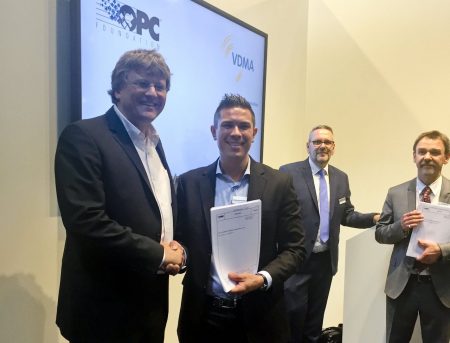The OPC UA machine vision and robotics working groups have released the first versions of their companion specifications at the automation trade fair Automatica in Munich, Germany.
Two years ago at Automatica 2016, VDMA Machine Vision and OPC Foundation signed a memorandum of understanding to prepare an OPC Unified Architecture (UA) machine vision companion specification.
The first version of OPC UA Companion Specification for Machine Vision (OPC UA Vision) provides a generic model for all machine vision systems, from simple vision sensors to complex inspection systems.
 Part 1, published today as a release candidate version describes the infrastructure layer, which is an abstraction of the generic machine vision system. It allows the control of a machine vision system, abstracting the necessary behaviour via a state machine concept. It handles the management of recipes, configurations and results in a standard way, whereas the contents stay vendor-specific and are treated as black boxes.
Part 1, published today as a release candidate version describes the infrastructure layer, which is an abstraction of the generic machine vision system. It allows the control of a machine vision system, abstracting the necessary behaviour via a state machine concept. It handles the management of recipes, configurations and results in a standard way, whereas the contents stay vendor-specific and are treated as black boxes.
“Interoperability is the key for distinguishing our products in a connected world of Industry 4.0,” commented Dr. Horst Heinol-Heikkinen, chairman of the VDMA OPC Vision initiative. “With today’s release of the companion specifications, we have reached a major milestone on this way.”
The OPC UA Companion Specification for Robotics (OPC UA Robotics), meanwhile, provides a standardised information model that is capable of presenting all robot related data regardless of manufacturer or location.
Besides the release of the two new companion specifications, a demonstrator for skill-based control with OPC UA was presented at Automatica. The demonstrator is an assembly cell producing fidget spinners, and integrating systems and components from more than 20 manufactures, all of which communicate via OPC UA.
VDMA is co-founder of the pre-competitive and non-profit association Labs Network Industry 4.0 (LNI), which runs test-beds and use-cases focusing on SME requirements and standardisation validation. The University of Applied Sciences Ravensburg-Weingarten, Germany, plans to host in its lab the first test-bed together with industry partners.
“The practical validation by users, including SMEs, is a key to success for the international standardisation activities to follow,” Dr. Christian Mosch from VDMA Forum Industrie 4.0 commented. The test-bed is open to any new partners.
The OPC UA Vision companion specification is now available free of charge as VDMA specification number 40100 (as release candidate version), while the robotics companion specification is available as VDMA specification number 40010 (as draft version). Both specifications can be requested at opcua@vdma.org.